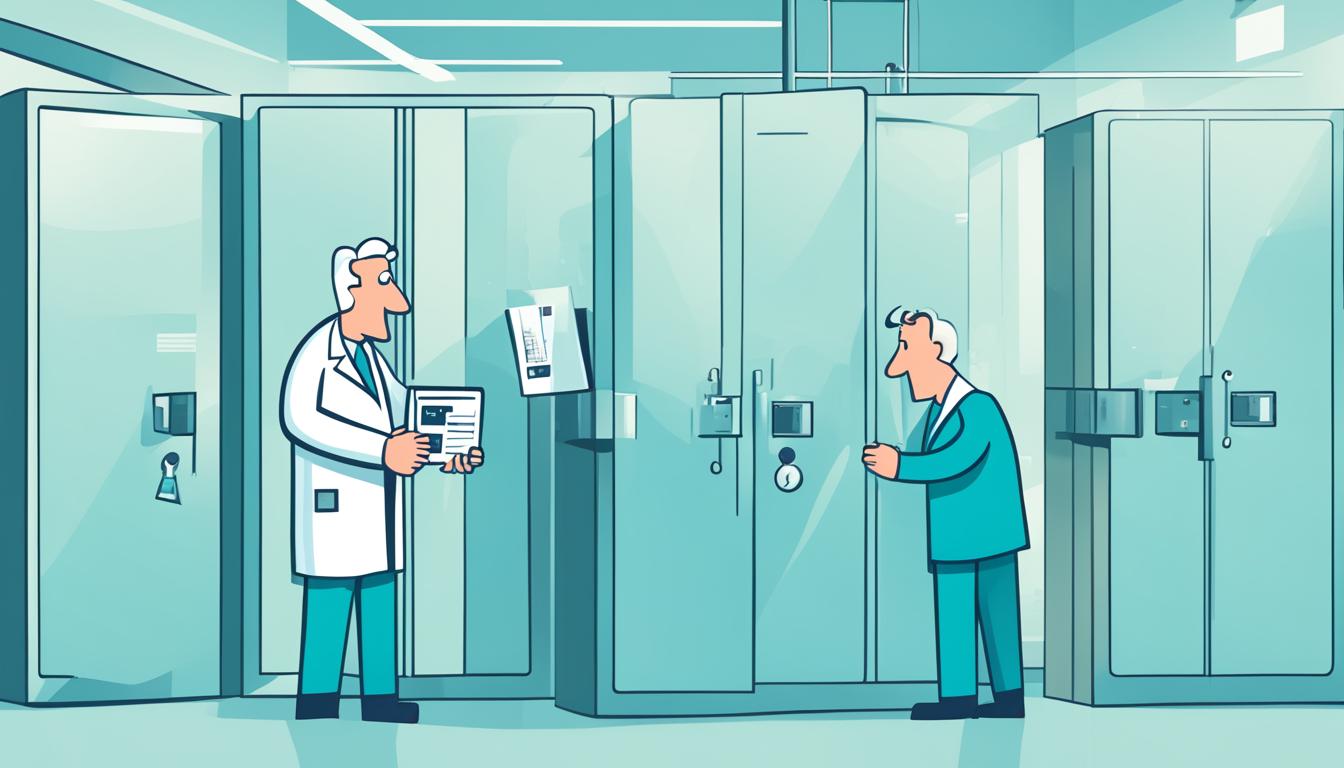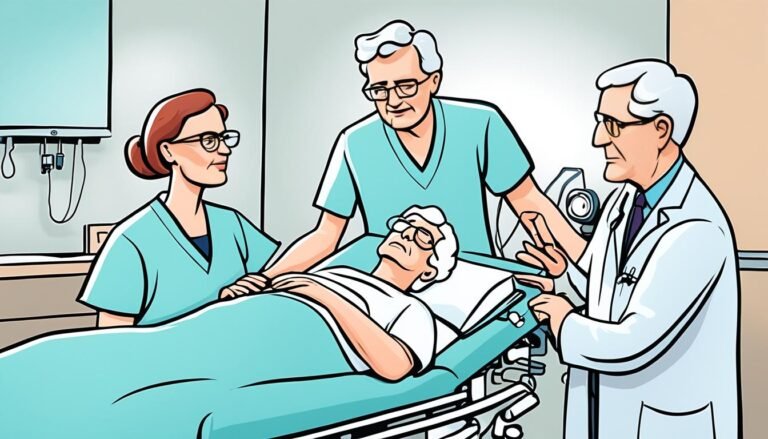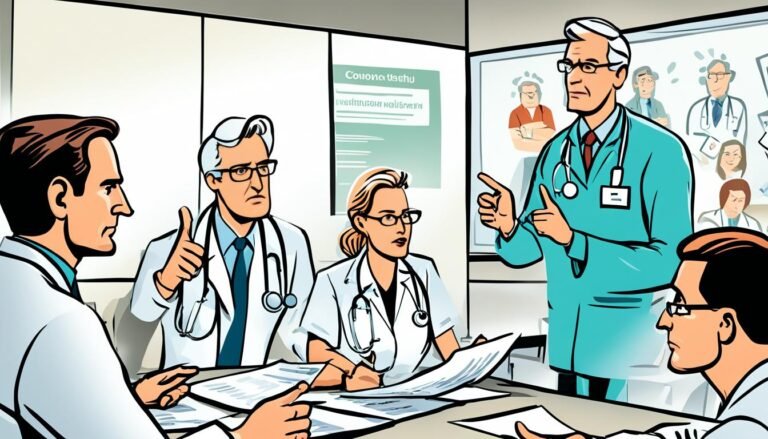Privacy and Confidentiality in Patient Care
Healthcare makes privacy and confidentiality very important. This is key for patient trust and keeping medical details safe. We’ll look at how patient privacy gets protected. And we’ll see why being HIPAA compliant matters. We aim to explain data protection, privacy laws, and protocols for patient confidentiality. Let’s dive in to learn what healthcare providers and places must do. They work hard to keep patient information safe and follow HIPAA rules. Discover the secrets of patient privacy and its vital role in healthcare.
Key Takeaways:
- Ensuring patient privacy and confidentiality is crucial in maintaining trust and protecting sensitive healthcare data.
- HIPAA compliance is essential for healthcare institutions and workers, providing guidelines for safeguarding patient information.
- Healthcare professionals must adhere to medical confidentiality laws, including the HIPAA privacy rule and security rule.
- Patient privacy protocols cover various aspects, such as obtaining consent, handling sensitive PHI, and maintaining confidentiality in healthcare interactions.
- Understanding the rights and authorizations of patients is vital for upholding their privacy and respecting their preferences for sharing PHI.
The Importance of Privacy and Confidentiality in Patient Care
Keeping patient information private is key to keeping their trust and independence. Healthcare workers need to make sure that information about patients is kept safe. This includes things like their personal space and private choices.
This also means respecting what patients want, even in discussions or medical visits. Doctors and nurses need to get permission if someone else wants to join in. They should also ask before recording any pictures or sounds about a patient.
“Privacy is not an option, and it should never be compromised. As healthcare providers, we must always prioritize patient privacy and maintain the highest standards of confidentiality to build and maintain patient trust.” – Dr. Emily Johnson, Chief Medical Officer at ABC Hospital.
It’s just as critical to protect a patient’s privacy outside the hospital. For example, caution is needed when the media asks for private information. Doctors must ensure that all patient data is kept safe.
When healthcare workers make privacy a top concern, patients feel more willing to talk honestly. This leads to better outcomes for their health. Knowing their secrets are safe makes patients more at ease.
Ensuring Patient Trust through Privacy and Confidentiality
Patients trust more when they know their secrets are safe. This confidence encourages them to fully engage in their care. They can then provide doctors with the necessary information for good diagnoses and effective treatments.
If a patient’s privacy is mistakenly shared, it can harm everyone involved. It can lead to a lack of trust in the health system. This trust is hard to build and easy to break.
Healthcare places that focus on keeping data safe make patients feel they can talk freely. They’re not worried about their private thoughts being used in the wrong way.
HIPAA Compliance and Patient Privacy
HIPAA compliance is important for everyone in healthcare, involving patient private information. If you’re going to share or talk about this info, you need the patient’s okay, except for some special cases. These special cases are for things like patient care, getting paid, or when the law says you must. Everyone helping in healthcare must follow HIPAA, not just doctors and nurses.
Protected health information or PHI includes info about your health, whether exchanged digitally or shared in conversation. It’s about keeping what the doctor knows about you, private and secure. All places where they look after you have to follow strict rules to keep your information safe.
The Importance of HIPAA Compliance
Sticking to HIPAA rules is key for a few good reasons:
- It keeps patients’ health details safe, creating trust between doctors and those they help.
- It stops bad guys from getting that information, protecting patients from harm or fraud.
- Not following HIPAA can lead to big fines or even getting in trouble with the law.
- It makes how health records are used clear, helping healthcare run smoother and better for patients.
Exceptions to Consent under HIPAA
Even though HIPAA likes patient say in sharing health info, certain rules allow sharing without asking them first:
- Healthcare Operations: Sharing PHI can help with making healthcare better, train staff, or get needed certificates.
- Treatment: Doctors can talk and share with each other about your care without needing more permission.
- Payment: Your treatment costs can be discussed to make sure bills get paid right or to check with insurance.
- Information Required by Law: In some cases, laws might force the sharing of health info, like when there’s a serious illness to report or for legal issues.
Healthcare workers need to know these exceptions well. It helps in handling information safely and keeping patient info secret. Following these HIPAA rules makes sure patient privacy and health information are always respected.
HIPAA Privacy Rule Application
The HIPAA privacy rule covers every part of a medical facility. It aims to protect patients’ health information. This rule applies to all healthcare communication, online or offline.
Healthcare workers must only share basic health details during treatment. They can’t discuss private info when others are around. This helps keep patients’ info safe and private.
This rule also follows state and federal laws on health privacy. These laws might focus on special health issues like infectious diseases or mental health. It’s important for healthcare workers to know all health privacy rules.
Following the HIPAA rule and other laws helps healthcare workers keep patient info private. This way, they can offer the best care while respecting privacy.
Patient Rights and Authorizations under HIPAA
When patients go to a hospital, they get certain rights under HIPAA. Part of HIPAA is telling patients how their private health info might be shared. This is called a notice of privacy practices.
This notice tells patients about their right to expect privacy. It also gets their OK to share certain health info during care. Patients sign this notice, and it’s kept on file. This helps make sure patients know their rights and can ask questions about their health info.
Patients can ask that their health info not be shared with some people, which the hospital must respect. The place must keep a record of these privacy requests to keep patients’ info safe and private.
Patients can also ask for more privacy than usual. They might not want their health info shared for some reasons. Their requests are written down in their medical record. This is to make sure the hospital respects their wishes.
Exploring Patient Rights
Under HIPAA, patients get lots of rights about their health info. They can ask to see their records, change wrong info, check who saw their health records, and set rules on who can see their health info.
These rights help patients look after their health info. They make sure their info stays private and safe.
Patient Authorizations and Consent
It’s important for patients to agree on sharing their health info for non-regular care. This might be for things like studies, legal needs, or with others like insurance companies. The hospital needs patients’ OK first.
The hospital must clearly say why they need to share the info. They must get written OK from the patient. Patients can say no if they want. They should understand what’s happening with their health info.
Patients’ trust in the healthcare system relies on respecting their privacy and confidentiality. By understanding and upholding patient rights, healthcare institutions can build and maintain strong relationships with their patients.
Keeping patient info private and respecting their rights is both a rule and the right thing to do. By making privacy key and info safe, healthcare workers give good care and build trust.
| Key Patient Rights |
|---|
| The right to access their own medical records |
| The right to request amendments to their medical records |
| The right to request an accounting of disclosures |
| The right to request restrictions on the use or disclosure of their PHI |
Security Measures and Flexibility under HIPAA
Healthcare institutions must use security measures. This is to make sure protected health information (PHI) stays safe. They have to guard PHI from possible risks.
The HIPAA security rule is useful and flexible. It lets institutions choose security methods that fit their situation. This means they can be effective and easy to manage.
To protect electronic PHI, institutions should do several things:
- Set up access controls, like unique user IDs and passwords.
- Encrypt PHI for privacy.
- Do regular risk assessments to find and fix security holes.
- Create safe ways to handle and throw away PHI.
- Teach staff about security rules.
- Check for and react to any security problems quickly.
With these steps, healthcare sites keep patient data safe. They also follow HIPAA laws and keep a good reputation. Everyone working in healthcare needs to help keep PHI secure. They should also learn about new security ideas.
Benefits of Flexibility in Implementation
HIPAA’s flexibility lets healthcare sites adjust security measures as needed. They can use their resources smartly without risking data safety.
Every healthcare site is different. They can use what works best for them. For example, smaller sites might pick cheaper options. Bigger sites might go for more advanced security.
This approach also encourages finding new and better ways to keep data safe. Sites can update their security steps to match new risks and tech. This keeps healthcare data private and reliable.
Overall, HIPAA’s measures and flexibility help healthcare sites a lot. They can ensure data safety by being careful and up-to-date. This helps them keep their patient’s trust and ensures data is always kept safe.
| Benefits of Security Measures and Flexibility under HIPAA |
|---|
| Protection of electronic protected health information (PHI) |
| Compliance with HIPAA regulations |
| Efficient allocation of resources |
| Continuous improvement and innovation in data security practices |
| Maintaining trust and confidence of patients |
Exclusions and Disclosures of PHI under HIPAA
HIPAA places limits on sharing protected health information (PHI) to protect patient privacy. Usually, healthcare providers need patients’ okay to share PHI. But, there are some special cases where sharing is allowed.
Mental health notes, and legal documents about medical records, are a few types of PHI not usually shared without consent. Also, things like STD test results fall into this group. Because they’re so private, it’s important they’re kept secret.
Sometimes it’s okay to share PHI without asking first. This could be for public health, fraud investigations, or if the patient can’t give consent. In these urgent times, healthcare workers must use their best judgment and follow HIPAA’s rules.
Healthcare pros should always think carefully before sharing PHI. They should know the rules well. This helps them keep their patients’ private info safe and still follow the law.
For more details on PHI exclusions and rules, check out this table:
| Types of PHI | Disclosure Authorization Required? |
|---|---|
| Mental Health Notes | No |
| Legal Documents Pertaining to Medical Records | No |
| Laboratory Results (e.g., STD related) | No |
| Public Health Concerns | May be necessary |
| Investigations of Fraud | May be necessary |
| Patient Incapacitation or Emergency Situations | May be necessary |
Knowing how to handle PHI under HIPAA is key for healthcare workers. It helps them protect patients’ privacy and follow the law while caring for people.
Audio and Visual Recording of Patients
Recording patients can be great for learning in healthcare. But, we must protect their privacy too.
Healthcare workers need patient permission before recording. This makes sure patients know they’re being recorded and can share any worries. They must keep personal info safe to protect privacy.
It’s really important that the recordings are correct and follow all rules. This means attention to detail and no mistakes about the care given to patients.
For recordings shown to the public, it’s on healthcare workers to look out for their patients. They need to be sure everything shown is true, complete, and only for the patient’s good.
Recording patients’ audio and video can help teach a lot in healthcare. But, we must always put patient privacy first, act professionally, and make sure the recordings help both education and patient well-being.
Benefits of Audio and Visual Recording in Education
Recording patient interactions can help healthcare workers get better. They can watch how they talk to patients and improve. It also helps train new healthcare workers using real patient cases to build their skills.
Ethical Considerations in Patient Recording
Using recordings for learning has big advantages. But, it’s key to respect patient privacy and follow the rules. Healthcare people need clear permission and to keep the recordings safe and private.
“Patient recording in healthcare education can greatly enhance the learning experience for students. However, it is imperative to maintain patient privacy and ensure that recordings are used ethically and responsibly.”
– Dr. Elizabeth Johnson, Medical Education Expert
Professional Conduct in Patient Recording
Rules must be followed when recording patients. This means always thinking about the patient first, keeping things private, and using recordings just for learning. It’s also about looking at the ethics of recording patients regularly, to keep their faith.
Specific HIPAA Rules for PHI Security
HIPAA spells out rules to keep protected health information (PHI) safe. It aims to make sure that electronic PHI stays confidential, integral, and secure in healthcare settings. It’s essential for keeping patient info safe and building trust.
Electronic PHI Protection
Healthcare places must look after all electronic PHI they make, use, or send. This covers patient information in things like electronic health records and digital images. They need to set up secure ways for only the right people to access this data. This keeps it safe from anyone getting in who shouldn’t be there.
Reasonably Anticipated Hazards
Hospitals and clinics need to think ahead about what could go wrong with PHI security. They should find and fix risks, like people getting into data they shouldn’t or it getting lost. This is done by doing regular checks to make sure everything is as safe as can be.
Security Measures
HIPAA’s security rules are custom to fit each place’s needs and abilities. It’s key to have well-thought-out policies that cover everything from technical to management steps. Things like firewalls, ongoing employee training, and close security checks help a lot.
“The protection of electronic PHI is paramount in ensuring patient privacy and security. Healthcare institutions must remain vigilant in their efforts to prevent unauthorized access and comply with HIPAA security regulations.”
Focusing on HIPAA’s PHI security rules helps healthcare keep patient info safe and follow data protection laws. This means putting strong safety measures in place, preparing for problems, and always watching the security details. Doing these things means patients can be sure their private info is in good hands.
Conclusion
Privacy and keeping information confidential are key in healthcare. They help build trust with patients and keep their data safe. Following HIPAA rules and having strong security is crucial. It shows that healthcare places and workers take patient rights seriously. They protect healthcare data well.
Privacy and confidentiality are very important, and they help patients trust their healthcare providers. Patients should know their info is safe and not shared without permission. These practices are backed by HIPAA, which helps healthcare places keep information private through good rules and steps.
Healthcare pros make the system safer by making sure patient info is private. This stops people who shouldn’t from seeing it. They must follow HIPAA not just because it’s required, but because it’s right for their patients and the wider community. This way, they ensure data says safe and trust grows between them and their patients, leading to better care.
FAQ
What is the importance of privacy and confidentiality in patient care?
**Privacy and confidentiality are key for patient trust and choice.** They guard personal space, data, decisions, and bonds. All healthcare spots, from doctor’s offices to talks, must honor privacy.
What is HIPAA compliance and why is it important?
**HIPAA compliance means following the rules of the Health Insurance Portability and Accountability Act.** This law protects patient information, controlling how it’s shared by healthcare folks and places.
How does HIPAA address patient privacy?
It has a privacy rule. This rule guides how health info should be used and shared. It lists what’s considered private health info and when it can be shared without asking first.
What rights do patients have regarding their privacy under HIPAA?
**Patients are entitled to a privacy practices notice.** This shares what health info might be shared and what privacy rights they have. They can also add extra privacy wishes, which must go in their files.
What are the security measures under HIPAA?
**HIPAA’s security rule mandates** that healthcare places keep digital health info safe and private. They can pick how to do this, based on what they have and need.
Are there any exclusions or exceptions to the disclosure of PHI under HIPAA?
**Some PHI, like mental health notes, or STD test results, can’t be shared without a patient’s clear okay.** But, there are times when you don’t need their okay, like for public health needs or in fraud checks.
Can healthcare professionals record patients for educational purposes?
**For educational videos, healthcare folks can film patients with their say, keeping names and faces private.** They should make sure what they show is right and meets high standards.
What are the specific rules for the security of PHI under HIPAA?
**Healthcare places must keep digital PHI safe, private, and correct.** They need to be ready for any digital dangers that might hit PHI’s security.
How does patient privacy and confidentiality contribute to healthcare data protection?
**Guarding patient privacy and keeping data safe through HIPAA helps prevent unwanted data views.** This keeps the data whole and secret.







